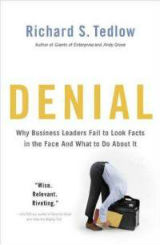It’s remarkable how debilitating denial -- the willful failure to look facts in the face -- can be to the life of Christian institutions and their leaders. 
In hyperbolic fashion, a recent episode of the NBC sitcom Parks and Recreation demonstrates the point. Party-loving government administrative assistant, Tom Haverford, forms his own company, Entertainment 720. Tom creates E720 “offices” that closely resemble after parties at Times Square on New Year’s Eve -- iPads are handed out like candy, highly-paid NBA player start pick-up games with visitors, and bored administrative assistants (who just happen to look like super models) make 100K.
It’s not long until Tom calls his friend and government penny-pincher, Ben Wyatt, to look over his company’s almost non-existent books. Ben immediately recognizes the extravagant spending and lack of revenue (or even a business plan) will cause the demise of the fledgling company. Ben tells Tom the unpleasant truth about E720. What does Tom do? He kicks Ben out the door, only to hire three more accountants who (surprise) eventually tell him the exact same thing.
Clearly, Tom suffers from denial. He denies that he’s really much better at throwing parties than running a business. He denies harsh financial realities. He denies his complete lack of a feasible business plan.
The episode caricatures the point Richard Tedlow makes in his book, “Denial: Why Business Leaders Fail to Look at Facts in the Face – and What to Do About It.” Although geared to business leaders, the book has much to recommend to contemporary mainline churches facing decline in participation and other organizational challenges.
Tedlow charts how denial infected CEOs like Henry Ford back in the early twenties, when his company began flat-lining because he thought he could go on making the model T forever. Tedlow writes, “It is an old saying that the time to make a change is when you don’t have to. Everybody knows it. Nobody would argue with it. Few abide by it.” Textbook Ford.
That was one symptom of Ford’s denial; the other was the amount of “yes men” he kept around him. “Powerful people are routinely surrounded by yes-men,” Tedlow writes. “They don’t really know as much as they may think about their own organization because people stop telling them the truth.”And what happened to the one guy -- Ernest Kanzler, the brother-in-law of Ford’s only child -- who did pluck up the courage to tell Ford the uncomfortable truth? “His reward was the same as others who do so. He was fired.”
For decades, we church leaders have sensed there are considerable challenges on the horizon for our congregations and the denominations that sustain them. Are we more inclined to stare reality in the face, or deny it?
Toward the end of the Parks and Recreation episode, Tom comes back to tell Ben that he was right and that the company was going bankrupt. Unlike the fictional E720, it’s not too late for the church. If you’ve been denying some truth and have pushed someone out of the way in the process, perhaps it’s time to invite them back. They may be the change agent you need on your board or at the committee meeting. Such gestures cultivate an organizational culture that values the people who bring an oddball, opposable view. Cultivate leaders who value differences of opinion and who sit comfortably in healthy conflict. Most importantly, cultivate these qualities in yourself.
The truth may just set you free -- to change.
Nicole M. Havelka is an ordained minister in the United Church of Christ and serves as the associate conference minister for youth and young adult ministries in the Iowa Conference UCC.







